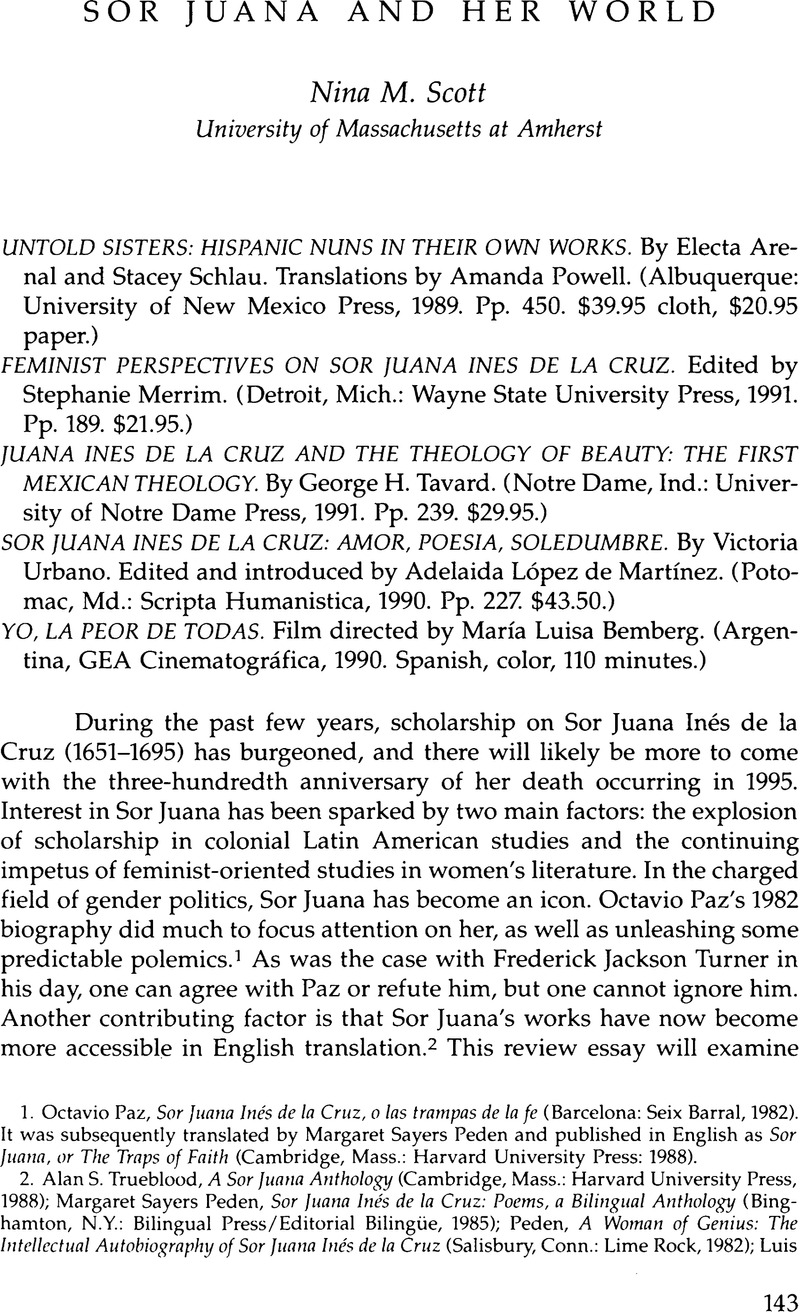Published online by Cambridge University Press: 05 October 2022

1. Octavio Paz, Sor Juana Ins de la Cruz, o las trampas de la fe (Barcelona: Seix Barrai, 1982). It was subsequently translated by Margaret Sayers Peden and published in English as Sor Juana, or The Traps of Faith (Cambridge, Mass.: Harvard University Press: 1988).
2. Alan S. Trueblood, A Sor Juana Anthology (Cambridge, Mass.: Harvard University Press, 1988); Margaret Sayers Peden, Sor Juana Ins de la Cruz: Poems, a Bilingual Anthology (Binghamton, N.Y.: Bilingual Press/Editorial Bilinge, 1985); Peden, A Woman of Genius: The Intellectual Autobiography of Sor Juana Ins de la Cruz (Salisbury, Conn.: Lime Rock, 1982); Luis Harss, Sor Juana's Dream (New York: Lumen Books, 1986); and Nina M. Scott, If you are not pleased to favor me, put me out of your mind : Gender and Authority in Sor Juana Ins de la Cruz, and the Translation of Her Letter to the Reverend Father Maestro Antonio Nez of the Society of Jesus, Women's Studies International Forum 11, no. 5 (1988):42938.
3. Asuncion Lavrin is about to publish a new study with a valuable bibliography on this subject. See La vida femenina como experiencia religiosa: biografa y hagiografa en Hispanoamrica colonial, forthcoming in Colonial Latin American Review. See also Kathryn Joy McKnight, Voz, subjetividad y mstica en la Madre Castillo: tres elementos de una escritura femenina conventual, Texto y contexto 17 (Sept.Dec. 1991):6697.
4. Paz, Sor Juana Ins de la Cruz, o las trampas de la fe, p. 165.
5. Ann Miriam Gallagher, R.S.M., The Indian Nuns of Mexico City's Monasterio of Corpus Christi, 17241821, in Latin American Women: Historical Perspectives, edited by Asuncin Lavrin (Westport, Conn.: Greenwood, 1978), 153.
6. See Gallagher, Indian Nuns, 153; and Arenal and Schlau, Untold Sisters, 355.
7. For example, Tavard renders the following verses of Sor Juana's famous sonnet En perseguirme, Mundo thus: Y no estimo hermosura que, vencida / es despojo civil de las edades, as I do not value beauty that, vanquished, / has been left politely by the years (p. 172).
8. Failing that he could have contacted me, since he used my translation of this letter in his work.
9. Mndez Planearte lists this romance as being sin fechas conjeturables. See Obras completas de Sor Juana Ins de la Cruz, vol. 1, Lrica personal, edited by Alfonso Mndez Plancarte (Mexico City: Fondo de Cultura Econmica, 1976; first published in 1951), 1:5.
10. John King, Assailing the Heights of Macho Pictures: Women Film-Makers in Contemporary Argentina, in Knives and Angels: Women Writers in Latin America, edited by Susan Bassnett (London: Zed, 1990), 161.
11. Ibid., 160.
12. Paz, Sor Juana Ins de la Cruz, o las trampas de la fe, 37071.
13. Bemberg chose to cast the Bishop of Puebla as one of Sor Juana's betrayers, differing here from most scholars (and from Paz), who view him as the nun's friend and supporter.
14. Nissa Torrents, One Woman's Cinema: Interview with Mara Luisa Bemberg, in Knives and Angels, 174.